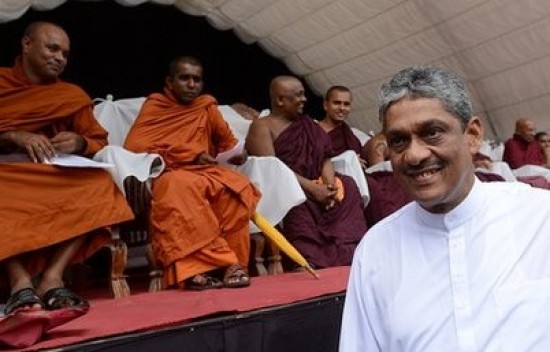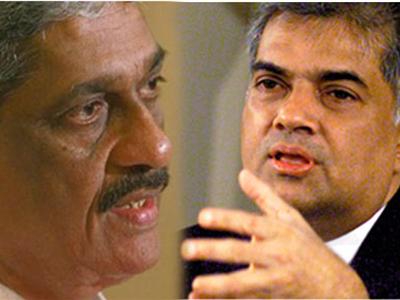The tragedy of opposition politics, rally debacles and gross abuse of power by govt
Fissures within the Opposition
The inaugural public rally organized by the Eksath Bhikkshu Peramuna (United Bhikku Front)
on October 18 revealed the fissures within the ranks of the opposition. The event was publicised as being the public coming together of a coalition of forces to abolish the institution of the Executive Presidency. The organizers of the event claimed that it was being held to mobilize public support for their cause and not to promote any one political leader. They actively sought the support of all opposition parties and civil society groups to this end. In addition, the rally was initially advertised as an event at which the opposition leadership along with their party members would participate. However, this did not happen. The only opposition figure of consequence on the stage was former General Sarath Fonseka. The rest of the opposition leadership did not attend the function.
Less than impressive numbers
The number of people who attended the rally was also less than impressive. While the sporadic rain was blamed for this, the more plausible explanation for the disappointing turnout lies elsewhere. In today’s context the only way to mobilize a large number of people to attend a political event is through the machinery of political parties. The days in which people would spontaneously attend anti-government rallies are long past. This is because of the prevailing culture of fear. Sri Lanka has suffered from repressive rule since 1971 when the JVP made its first abortive insurgency. This created the basis for successive governments to progressively arm themselves with more and more repressive powers. Despite the repeal of Emergency Regulations after the war, the culture of fear continues as the methods of dealing with those who are considered to be threats to the government can be drastic.
Culture of fear
There is no doubt that there is a vast untapped reservoir of resentment against the excesses of the Executive Presidency and its ability to concentrate power in the hands of fewer and fewer. There was the hope that the popularity of General Fonseka and distaste for the abuses of power of the Executive Presidency would bring people spontaneously to attend the rally. However, the culture of fear and the rains were a potent combination to keep away those who might have attended out of personal convictions. Due to the absence of participation by the main political parties, there was no party machinery available to bring people to attend the rally organized by the United Bhikku Front. Therefore the organizers had to rely on their personal contacts and the network of supporters that former General Sarath Fonseka had developed during his presidential campaign of 2009.
Opposition tragedy
For the past two decades the issue of abolishing the Executive Presidency has been on the national agenda. In 1994, former President Chandrika Kumaratunga promised to abolish the institution if she was elected as President.
Identical promise
In 2005, President Mahinda Rajapaksa made an identical promise. Both of them failed to deliver on their promises. The task of championing the cause of abolishing the Executive Presidency devolved in 2009 to former General Sarath Fonseka, who had retired from his post as Army Commander to contest the Presidential Elections held that year as the common opposition candidate. However, after the spirited fight he gave to the incumbent President at the election, he received severe punishment that saw him stripped of his army ranks and pension and also incarcerated in prison for close to three years. Upon receiving his freedom he has been trying to reactivate his political career. The rally organized by the United Bhikku Front seemed to provide an ideal forum.
Tragedy of opposition politics
The rally was about a national issue on which there is considerable public interest. It reveals the
tragedy of opposition politics at the present time that the divisions within the opposition prevented it from utilizing an opportunity to make a strong statement about abuse of power to the government. The poor public attendance that was widely propagated in the media, particularly the government media, was an outcome of the inability to forge a common opposition front. This is a national tragedy as there are many urgent issues facing the country on which the opposition needs to unite. The foremost of these is the manner in which power and wealth are getting concentrated in fewer and fewer hands. The Divineguma Bill that undermines the powers devolved to provincial councils and has a secrecy clause in it that makes for non-transparency in vast sums of money, is now before the Judiciary. This proposed law is not about the Executive Presidency but is about the formation of a super-ministry.
Larger issues of institutional survival at stake
There is a tendency in Sri Lanka to attribute personal motivations to decisions that involve institutions. Even the current tensions between the Executive and Judiciary are being attributed to personal issues. But there are larger issues of institutional survival and integrity that are at stake that must not be discounted. There is the need to have a show of strength that is mobilized by the opposition parties to make it clear to the government that people are concerned about the excesses of the Executive Presidency and do not wish them to continue. Opposition leader Ranil Wickremesinghe was criticized at the rally for his decision to stay away from the rally, as well as for forbidding his party members from joining it. A handful of his party members who defied the party decision not to take part in the rally will now have to defend their conduct before internal party disciplinary processes.
Strategic concerns
However, it must be kept in mind that it was not only the UNP that kept away from the rally, it was also the JVP. Both of these parties have powerful party machineries that are capable of easily mobilizing thousands of people to attend any event. The tactical problem they faced was that their thunder would have been stolen by others at the rally, in particular by General Fonseka who is believed to be the most popular figure in the opposition, due to his charisma and reputation as Sri Lanka’s former army commander who led the battle against the LTTE. He and his supporters might have been able to claim that the crowds came for the rally because of the General. By not putting their party machineries to use, the UNP and JVP were able to show that General Fonseka cannot mobilize people on his own without the help of a political party machine.
Joint opposition invite by Ranil
The strategic approach of opposition leader Ranil Wickremesinghe is evident in his invitation to General Fonseka after the debacle of the rally to meet with him for discussions on joint opposition activities. There will be a need to discuss how any joint opposition campaign will be lead, and to whom the credit will go. There is also the need to agree on more than a one-point agenda that is limited to abolishing the Executive Presidency. There is also the need to agree on what to replace it with. There are also urgent and immediate issues that need to be addressed. The most important of these is to support the Judiciary to be independent of the Executive. It is noteworthy that those who assaulted the Secretary of the Judicial Services Commission of which the Chief Justice is the head, are still roaming free.
Abolishing the 13th amendment
There are also reports that the government is contemplating abolishing the 13th Amendment to the constitution under which the Provincial Council system was established. One of the main obstacles to the passage of the Divineguma bill is the judiciary’s determination that all the Provincial Councils should give it their assent prior to its passage as law. It is now being claimed by government spokespersons that the 13th Amendment is a national security threat as it can be used to divide the country. However, the abolishing of the provincial council system would have major implications for inter-ethnic relations. It continues to be the only avenue for some measure of inter-ethnic power sharing. A strategic approach by the opposition leadership is necessary to ensure that the national interest and justice prevails. It is not only necessary to defeat the rival claims of those in the opposition, but also of those in the government. The opposition’s voice needs to be heard louder and with more strategy.


